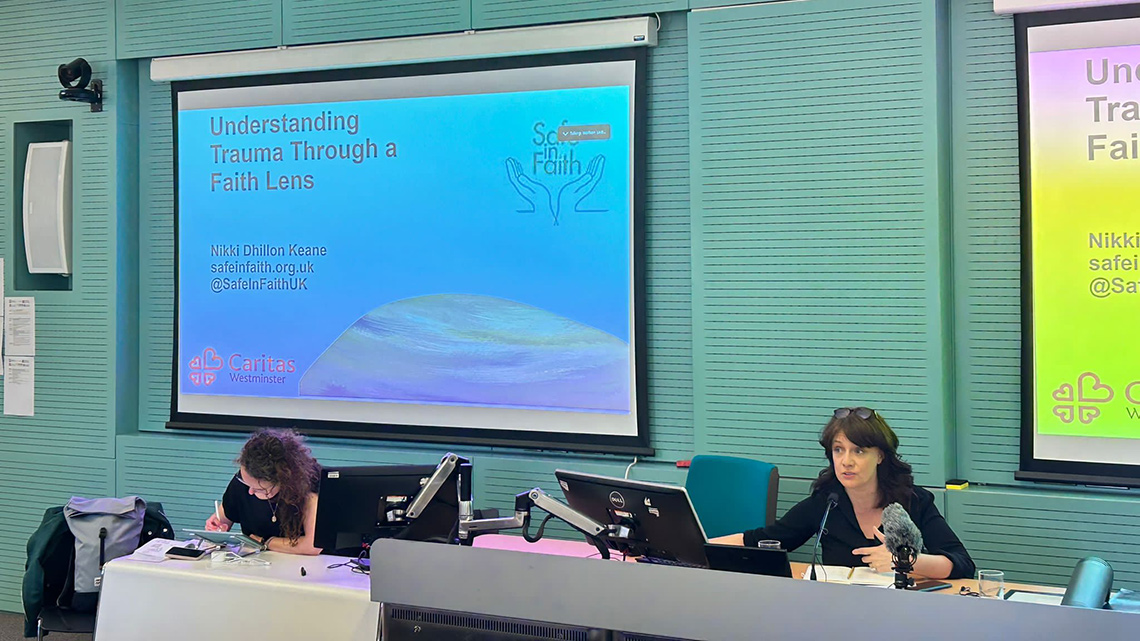
On 25 November each year, we mark the International Day for the Elimination of Violence Against Women. It also signals the start of a 16-day period to raise awareness of the global scourge of violence against women and girls.
Nikki Dhillon Keane is a Catholic psychotherapist and counsellor who specialises in domestic abuse, trauma and faith, and recently spoke on our Catholic News podcast strand.

She tells us that an important first step is to challenge the misconceptions that actually hamper our pastoral approach to supporting victims and survivors of domestic violence and abuse:
“We need to start by educating ourselves, because there are a lot of misconceptions around this subject that lead to barriers and sometimes make it really unsafe when we’re trying to help… Sometimes people think they’re helping, for example by bringing a couple together and trying to work with them together, but we know that’s actually an incredibly dangerous thing to do.
“So the very first thing is to educate yourself, to really understand the issues and the risks and the things that make it so very difficult to leave. We might think that ‘leaving’ is an obvious and easy thing to do, but it’s an incredibly dangerous thing to do. So not to pressure people to leave before they’re ready and before they have the support that they need.”
Nikki, author of a book titled ‘Domestic Abuse in Church Communities: A Safe Pastoral Response’ acknowledges that religious belief is important but can lead to problems:
“Faith can be an immense support but also, statistically, that faith can be an aggravating factor. We know that people who have religious faith tend to stay significantly longer in dangerous situations and the risk escalates over time… We know that if the perpetrators are aware that their victim has a religious faith, it’s quite likely that they will weaponise that faith.
“One of the forms of coercive control is spiritual abuse. For someone whose faith is important to them, weaponising their faith can be the most powerful way to control them and entrap them.”
So it is clear that a cautious and planned approach – a safe approach – is vital.
“Safe in Faith has developed a signposting toolkit which is on our website which helps people to [signpost safely]. And also looking at what it is that people in church settings can offer (which no one else can offer) which is that message that God loves you and wants you to be safe, and the Church supports you in being safe.”
She said that forgiveness plays a complex part in the healing process when it comes to abuse, and can even be used against victims by perpetrators:
“We need to understand the role of forgiveness in [healing process]. Because for some people forgiveness is really important. For some people forgiveness has been weaponised as part of the abuse.
“For some people forgiveness is something they will never ever see as appropriate because the harm has been too great. So we need to be able to accompany people on this journey with an awareness of what the role of forgiveness and justice is.”
Nikki finished with a message of hope for victims of domestic abuse, reminding them that God loves them and wants them to be safe:
“The first thing I would say is that God loves you, no matter what you may have been told, God loves you and God wants you to be safe. And there are people ready to support you when you are ready.
“And there are places you can contact to help you to be safe – there are places within the Church and there are places outside the Church, but God loves you and God wants you to be safe. Even if you can’t feel that in this moment because of the way the abuse has made you feel, the truth is that God is with you through this.”
If you feel unsafe at home or are worried about someone else, please contact:
The National Domestic Abuse Helpline: 0808 2000 247
nationaldahelpline.org.uk
Life Fear Free Helpline (Wales): 0808 8010 800
welshwomensaid.org.uk
Rape Crisis: 0808 5000 2222
rapecrisis.org.uk
Galop: 0800 999 5428
galop.org.uk
If you are concerned that you may be harming the people you love:
Respect Phoneline: 0808 8010 327
respectphoneline.org.uk
You can find more ideas and information about how to help by using these links: